- Home
- Fay Weldon
The Bulgari Connection Page 2
The Bulgari Connection Read online
Page 2
I tried to explain to the Court that it was not that I hated Doris, just that I wanted Barley to realise the intensity of my distress and desperation.
‘You really thought,’ enquired Judge Tobias Longue, ‘that if you ran down your husband’s mistress in a car park he would be sorry for you? Then you have lived a long time yet don’t know men very well. Good Lord, woman, he will have every excuse now for leaving you. You played into his hands.’ Tobias Longue was one of those lawyers who write thrillers, and had only recently been promoted to the bench. He had an eye and an ear for drama. He was both on my side, and not. There had been no witnesses. It was Doris’s word against mine. At the very worst, I told the Court, Doris had wrenched her ankle as she leapt out of the way of my Jaguar: but see how now she limped into court, pale and grave and prattling forgiveness.
‘She’s not in her right mind,’ Doris told Judge Tobias Longue. ‘I caught a glimpse of her face through the windscreen, her teeth bared, her mad eyes staring, just as the wheel went over my foot, and I felt this terrible pain and passed out. My fear as I fell was that she’d reverse back over me and crush me to death beneath that heavy car. She needs treatment, not punishment. She is unbalanced to the point of paranoia, an obsessive-compulsive. She suffers from pathological jealousy. I first met her husband when he appeared on my cultural review show: we are involved as colleagues in the setting up of a Cable TV company. But that’s all there is to it: good heavens, Barley Salt is a quarter of a century older than I am, and I regard him as a father.’
She spoke eloquently and persuasively, as was her trade. I stumbled through my few words. Of course she was believed.
Later she said to the Press, ‘Poor Mrs Salt. I’m afraid she belongs to the past, one of those prurient women who assume that if a man and a woman are alone in a room together, something sexual’s bound to happen.’ The Press forgot conveniently, when writing up the wedding, that at the time of the trial Barley and Doris vehemently denied any romantic involvement. Of course there was, starting from the very beginning in the Green Room, after everyone else had gone home, after she’d had him on her show, talking about the necessity of sponsorship of the arts by big business. I had watched that interview as a proud wife should, and seen the way she looked at him, the way his body inclined towards hers. He didn’t come home until early morning, and when he got into bed he smelt of TV studios, static electricity, sex and something else sickly and evil I couldn’t identify.
The prosecution asked for five years, I got three and served only fifteen months. In the event the Judge was less vindictive than anyone else around. At least he acknowledged the provocation. He said in his summing up it was a silly attempt with a car outside a supermarket and that Doris had jumped easily enough out of the way. And it’s true, she has perfect knees, being only thirty-three years old. At fifty-five, I already have one that is arthritic, though I didn’t let it stand in my way when I put the accelerator down. The pain in the heart is always worse than the one in the body.
It has taken me a year with Dr Jamie Doom the TV psychotherapist – he does take a few patients privately – to be able to face the facts of the matter. Doris Dubois is a superior human being to myself in every way and no sane man would not prefer her to me, in bed or out of it, as wife, partner or mistress. I face myself in the mirror, I look at my fading eyes and know that they have seen too much, and that there is no brightening them. What ages us is experience: there can be no forgetfulness.
‘But aren’t you angry?’ asks Dr Jamie Doom, ‘You must try to find your anger.’ But I can’t.
Perhaps God will reward me for having come to terms, as Dr Doom puts it, with my distress. I am sure no-one else will. This evening I am going to a party given by a pair of the kind ones, Lady Juliet Random and her husband Sir Ronald. It’s a charity auction in aid of ‘Lost Children Somewhere’. I am invited not just out of kindness but because I might be able to give a hundred pounds or so to Lady Juliet’s cause. Nothing compared to the thousands others give – I am only fifth or sixth division wealth now that I live on alimony – but no doubt still worth the champagne and canapés which I’ll consume. At least I don’t have to worry about meeting Doris and Barley at Sir Ronald’s: they move in more elevated artistic and political circles now. The parties they go to are attended by Arts Ministers, Leisure Gurus, Museum Moguls, Dotcom-Millionaires, Monarchs of the BBC and so forth. I tell you what, every now and then I could take Barley by surprise and make him laugh. I think Doris can do everything for Barley but that. She is too intent on pleasuring herself and him to have time for much mirth. But I daresay with age even my laughter, which once Barley loved, will turn into a witch’s cackle.
6
‘Who is the woman sitting in the corner?’ young Walter Wells asked Lady Juliet.
He had been studying her. She sat at rest as though posing for a portrait. He thought she looked lovely, whoever she was. She was not as young as she had been, it was true, but this gave her looks a kind of lush and wistful melancholy: he had been much taken in his childhood by images of the blown rose, of battered scarlet velvet petals, tempest tossed. Walter Wells thought perhaps he had been born a poet almost as much as an artist. Though now, at twenty-nine, he earned a living painting portraits, he sometimes felt that his heart was in language rather than in the image. But a man, however multi-talented, can’t do everything and the image paid better than words in the new century. So many languages it was only polite to learn, from Urdu to Serbo-Croat, that everyone had settled for symbols. A flat hand to stop you crossing the road was better than the word STOP, a green running man to show you the way out preferable to the word EXIT. So he had been practical and gone to art college, only to find the artist was as likely to live in a garret as the poet, unless he was very lucky.
It was in pursuit of luck that he was here at this charity auction today, where he knew no-one and felt altogether out of his generation. He it was who had painted the portrait of Lady Juliet Random, which was any minute now to be auctioned for the sake of Little Children, Everywhere, Lady Juliet’s favourite charity. He liked Lady Juliet and wanted to oblige her, she was good looking and relaxed and easy to paint and had only good things to say about everyone. She was quite voluptuous, and Walter Wells wished more of his sitters were like her. A good curve painted well, but in his experience if you blessed your sitters with a roundness of line on the canvas they only accused you of making them look fat.
‘Who can you mean?’ asked Lady Juliet. ‘The woman in the crushed velvet dress? Good Lord, that kind of fabric went out thirty years ago. But I’m glad to see she’s making an effort. It’s poor Grace Salt, the one who tried to mow down Doris Dubois in her Jaguar in a supermarket car park. You must have heard of her? No?’
‘No.’
‘Oh, you artists! Snug in your garrets, safe from the world.’ Walter’s portrait of Lady Juliet was to be the centrepiece of the auction. He had actually painted two, one which Lady Juliet would keep, the other a copy for the auction, painted for free, his gift in kind to Little Children, Everywhere. Lady Juliet had twisted his arm and melted his heart, as she was so good at doing, her soft mouth imploring, her eyes beseeching: he had done the extra work and not complained, though she had not even offered to pay for paint or canvas. People did not realise that these things cost money. The Randoms were pleased with the painting: they would hang it in pride of place on the wall of their library in their Eaton Square house, one of those stoic well-built cream-painted places with stolid pillars and steps and an air of infinite dullness, but at least he would know where it was. The copy would go to an unknown home. He did not like that.
‘The Salt scandal was in all the papers,’ said Lady Juliet, taking his arm, as she did at every opportunity. She was looking magnificent and charming both: such an art to be so grand and yet loveable, and thus to inspire in others more admiration than envy. She had a smooth, untroubled childish face, with small even features and a curved mouth given to laughter, and if she had
nothing nice to say she kept silent, which was more than most in her circle did. She was dressed tonight as she had been for the portrait, in simple slinky white and her plentiful probably blonde hair twisted on top of her head. Clasped round her neck, falling in roundels of bright colour against her firm, creamy skin was a Bulgari necklace, steel and gold set with cabochon emeralds, rubies, sapphires and brilliant cut diamonds, made in the sixties, and insured for £275,000, a sum Walter had heard mentioned as he worked.
Sir Ronald had charged more than once into the garden room, clouding the good North light with cigar smoke as was his habit, and doubted the wisdom of the jewels not being in the bank, couldn’t Walter work from a photograph? But Lady Juliet had said authenticity was so important, lights should not be hidden in bushels, jewels could not be forever in vaults or they lost their magic, what was the point of having these things if the world didn’t know about it, and so on. What was he afraid of? That Walter would run off with them? Slip the matching earrings into his pocket? Walter was too poetic a soul to run off with anything. He was an artist, everyone knew artists were above material things.
Which they obviously believed in their naivety, since Walter was being paid only £1800 to do the portrait – well, actually to do the two – and the Randoms assumed that was generous, and that they were doing him a kindness, employing and trusting a comparative unknown in the first place, introducing him to those levels of society where artists got more like £18,000 for a single fashionable portrait, than £1800 for a pair, which worked out at £300 a week for six weeks work. He would rather paint landscapes when it came to it: the weather kept changing and the light with it, but at least the landscape sat still.
‘So you want to be introduced to the woman in the corner in the crushed velvet dress,’ said Lady Juliet, ever happy to oblige. The jewels in her necklace glittered and glanced where they caught the light: the thing seemed magically, beautifully alive; he hoped he had got the intensity of it on the canvas: paint and brush could do only so much. But on the whole he was pleased. The copy, he thought, had been minimally better than the original: he had really got his hand in on the precious stones second time round, but he was the only one who would notice that. Only one in a hundred ever really noticed anything.
‘You only have ten minutes before the auction begins,’ said Lady Juliet. ‘I’m going to want you to go on stage and talk to them a little about art, and be altogether as languid and beautiful as you can, not that you have to try. They’ll think you’re photogenic and have a future and prices will triple. But do by all means talk to Grace first. I need her in a good mood. Barley gave her a good settlement, at least three million, and probably more, none of us like talking large figures in the press or they take us for fat cats, and I do so hate being called fat, even though I know I am. Little Children, Everywhere need women like Grace. The wretched of the earth could do with some of everyone’s alimony. This is the growth area, the future lies in this world of multiple divorces, multiple remarriages. Not just money to charity on death, but on divorce, too, an intrinsic part of any settlement. We all live far too well, with our champagne and our canapés, don’t you think? But what’s to be done? The world is what it is. All we can do is change our little corner of it.’
And so Walter Wells was introduced to Grace Salt at the Randoms’ charity do. There was the same difference between their ages as there was between Doris and Barley. Twenty-six years separated Grace and Walter, twenty-six years separated Doris and Barley.
Walter saw a woman with sad, dark, glowing eyes and a gentle, surprised expression, as if she was seeing the world for the first time. It was the same look a baby has, when it’s about twelve months old, and has learned that in order to walk and run you have to develop an indifference to sharp corners. He thought she was perhaps about forty: older than he was at any rate but who was counting? Her dress was in crushed deep crimson velvet, a texture and colour he longed to get on canvas. She wore it buttoned up to the neck and its long sleeves ended in sedate cuffs, as if she needed what small protection from the world even fabric could bring her. She wore no jewellery, other than small pearl stud earrings, on the kind of clips which bite the ear.
Of course he had thought of roses: his mother, a clergyman’s wife, had grown a wonderfully scented rose of that colour in the rectory garden where he had spent so much of his childhood. His mother had told him that its name was Flower of Jerusalem: a rather ordinary pink as a virginal bud, but deepening into crimson with every week of its flowering, until the petals were all but black, falling away, splaying, from the precious stameny centre they had once guarded so tightly.
Grace Salt sat alone, listening to the string quartet which played beneath a kind of pink plaster portico set above a blue transparent dais, lighted from beneath, which gave the players a ghostly glow. A firm called Fund Raisers Fun had provided it, along with little gold chairs, champagne and canapés, and it sat oddly indeed amongst the staid chintz, dull antiques and solid worth of the rest of the house.
He sat next to her on the green shot silk sofa. She forgot his name a second after Lady Juliet had introduced them, and gone, but politely asked him about himself. He said he was the painter of the portrait which was to be the centrepiece of the auction. She said she liked it very much: he had brought out Lady Juliet’s kindness. ‘Lady Juliet doesn’t want to look just kind,’ said Walter. ‘She’d rather be seen as significant. I tried to make her look severe, but alas, it’s the art of the portrait painter to bring out the soul of the sitter, and it is what it is.’ He had developed this line only an hour ago for the benefit of the handful of gossip columnists who’d blessed the evening with their presence. Walter had thought it was perhaps rather clichéd but they’d gone for it.
‘I know Lady Juliet is kind,’ said Grace, ‘because she asks me round to lunch quite often. Not kind enough to ask me to dinner, of course. But then unpartnered women, if they have no particular talent, or style, are so much a waste of an expensive place setting they quite offend the sumptuary laws.’
Walter’s father the rector had often spoken of the sumptuary laws when Walter had wanted a bicycle or new trainers, which other village children could not afford. Conspicuous consumption had always been seen as an offence to God and Man: in the Middle Ages actual laws were enforced. Spend too much too loosely and you got punished. Walter had not heard mention of the sumptuary laws since his father’s death, and though they had irritated him most profoundly at the time, they had now entered into the nostalgic narrative which composed the memory of his father. He felt she would understand his heart.
He said he was sure she could find a partner if she wanted one. A woman as beautiful as she. ‘You are so gallant,’ she said, ‘and quite absurd. You remind me of my son Carmichael.’ But she cheered up a little, and smiled at him with a kind of hazy half smile he found enchanting, and as if she now actually saw him. He liked her voice, it was croaky and deep, as if she had spent a lifetime drinking and smoking, though now she refused the waiter’s offer of champagne and took mineral water instead.
He thought he would like to see her face on the pillow next to him when he woke up in the morning. Those he so often saw were brutal in their confidence and self-esteem, the smooth texture of their skin unmarked by weariness or doubt. They bored him. He felt as old as her, or older, betrayed by a body which demonstrated all the vigour of youth, ill-matched to a soul which already felt jaded and world weary. And she would not ask him questions as they did, the ones who moved into his cold attic studio, lured by his looks and his easels and the romance of squeezed oil paints on stained wooden tables, and the unmade brass bed; but who within weeks would be jealous of his attention to canvas and not to them, and implying that painting was not a proper job. Off they’d go, to their smart well-appointed offices in publishing, or PR, or advertising or wherever, for a return on their labour far greater than any he was ever likely to achieve. And one evening they would simply not come home, but within a couple of days a brother
, or some gay friend, or a father would turn up to take away their possessions.
That the studio had a good North light, that crackling cold for some reason increased intensity of colour, had apparently not impressed them: the tenderness of his lovemaking could not make up for his reluctance to turn up the central heating. It had happened enough times – well, twice in as many months, within the last year – to make him feel this was to be the pattern of life and there was nothing much to be done about it. Yet he hated living alone. Art made a frugal bed companion. An older woman would surely be more sensitive as to how he lived, why he lived. It was true the skin round her jaw sagged a little, and curved lines ran between her cheeks and the corners of her mouth, and the division between lip and the rest was a trifle blurred, but she was the proper shape for a woman. He wanted to paint her. He wanted to be in her presence. He wanted her in his bed. Good Lord, he thought, this is love at first sight. He felt the need for a cigarette. He asked, nervously, if she minded. She had once, she said, been practically a chain smoker; but she had given it up in prison. It was so terrible in there it hadn’t seemed to matter if it was a few degrees more terrible still. He should go ahead. She didn’t mind. ‘Prison! What for …’ Walter was startled. ‘Attempted murder,’ she said.
Lady Juliet swooped and carried Walter Wells off, like a cat grabbing its kitten by the scruff of the neck and running off with it to safety. The auction was about to begin.
‘What exactly do you want me to say?’ he asked.
‘How art benefits humanity, all that kind of thing. Don’t worry about it. How you look is more important than what you say. No-one will be listening, just watching. Sometimes no-one bids at all, and the auctioneer has to take bids off the wall. That’s so embarrassing. But with you and me both here we should get a good price.’

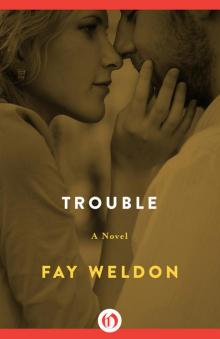 Trouble
Trouble The Heart of the Country
The Heart of the Country Wicked Women
Wicked Women Mischief
Mischief Long Live the King
Long Live the King Remember Me
Remember Me Worst Fears
Worst Fears Chalcot Crescent
Chalcot Crescent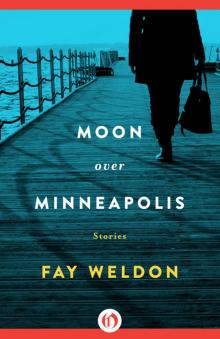 Moon Over Minneapolis
Moon Over Minneapolis The New Countess
The New Countess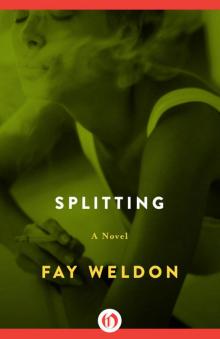 Splitting
Splitting After the Peace
After the Peace Habits of the House
Habits of the House Darcy's Utopia
Darcy's Utopia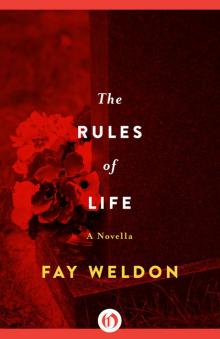 The Rules of Life
The Rules of Life Kehua!
Kehua! Before the War
Before the War Darcy's Utopia: A Novel
Darcy's Utopia: A Novel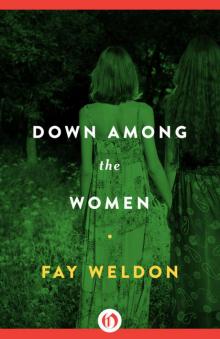 Down Among the Women
Down Among the Women Letters to Alice
Letters to Alice 3 Great Historical Novels
3 Great Historical Novels Female Friends
Female Friends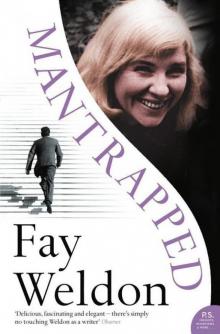 Mantrapped
Mantrapped The Bulgari Connection
The Bulgari Connection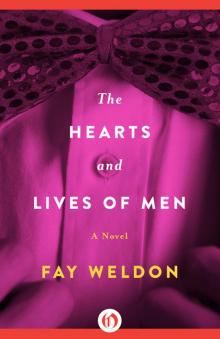 The Hearts and Lives of Men
The Hearts and Lives of Men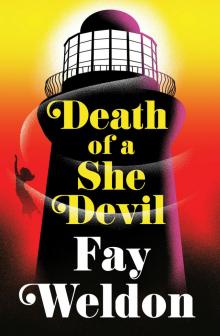 Death of a She Devil
Death of a She Devil